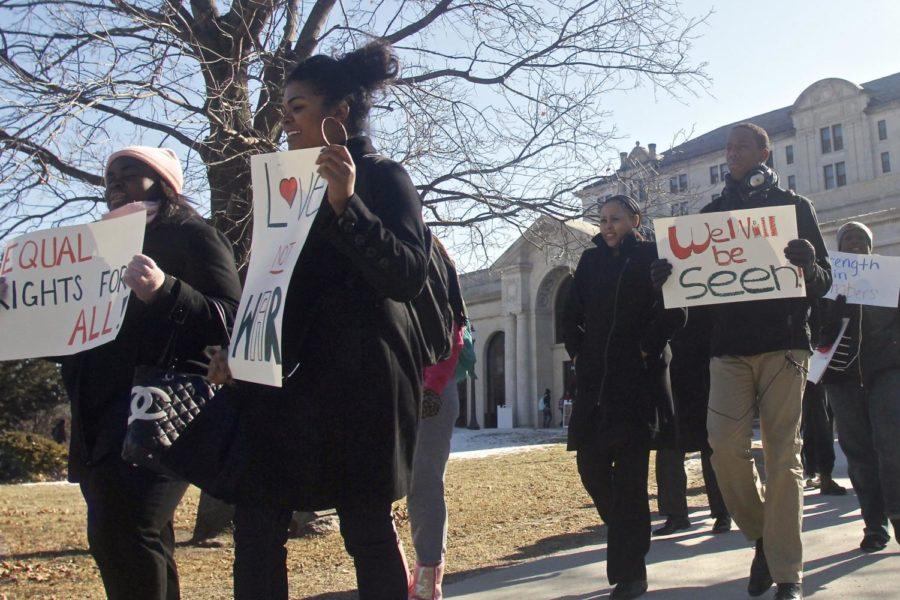Students march to commemorate Martin Luther King’s legacy
January 29, 2014
“He was a small man, but his words made him bigger than everybody else; that is the legacy that Dr. Martin Luther King Jr. left on this earth,” Thomas Hill, senior vice president of student affairs, said.
Hill spoke as part of the first-ever March on Parks, planned by the Black Student Alliance, yesterday to commemorate the birthday of King.
In a symbolic march from the Memorial Union to the front of Parks Library, around 10 students re-enacted the civil rights marches from the 1960s. During the march they sang traditional hymns, such as ”We Shall Overcome” or “This Little Light of Mine,” and held up signs demanding equal rights.
“I’m so happy with how it all went. The low number of students that showed up does not matter at all,” Teonna Flipping, BSA communication director and senior in speech communication, said.
According to Flipping, the march was all about the message and honoring Dr. King’s legacy. She said that she was grateful for every student who showed up for the very important cause.
“I think that students are aware of Dr. Martin Luther King Jr. and what he did, but I don’t think that most of them care,” Flipping said. ”And I’m not sure why that is the case.”
Flipping said she guesses that people got too comfortable with equal rights.
“We are so used to it and don’t think about the struggle people went through to make sure that we are in the position we find ourselves in today,” Flipping said.
This message not only applies to black people, but to all people, no matter the race, the gender or the sexuality, Flipping said.
“We are all equal and we have to fight to maintain that status,” Flipping said.
In front of Parks Library, Hill wrapped up the march by giving a short speech. He talked about the impact Dr. King had on him and what students can learn from his legacy.
“The key to your future is education,” Hill said. “Dr. King was one heck of a student. He graduated from college at the age of 15, and then he went on and got a [doctorate].”
From his perspective, he did his thing in the right way, an example that the entire current generation should learn from, Hill said.
“If you want to be successful in life, don’t come in here and tell me how good you look or how fly you are, because that isn’t going to cut it,” Hill said. “You’ve got to come in with some knowledge and some experience. You don’t do that by just talking about it.”
Hill said that everybody should think about Dr. King and his impact on the world.
“And then ask yourself, what are you going to do to honor this man, to continue his legacy, to make this world a better place? Education is the start of that. Without it, you are not going to do anything,” he said.
Gulshan Shaikh, junior in industrial engineering, said she was running on her way to her homework session when she heard Hill talking to the other students.
She said she didn’t know about the March on Parks, but she said Hill’s speech was so intriguing that she had to stop and listen to what he had to say.
“I admired his passion, and he had some very important things to say — [like] how we should take action on an individual level,” Shaikh said.
Shaikh said that the lack of participating students could be attributed to the fact that it was too cold outside, and that a lot of students were running from one class to another at that time.
Flipping said she agrees with that notion.
“We are thinking about making this an annual event, but we’ll probably move it to summer so that we have more attendants,” Flipping said.







